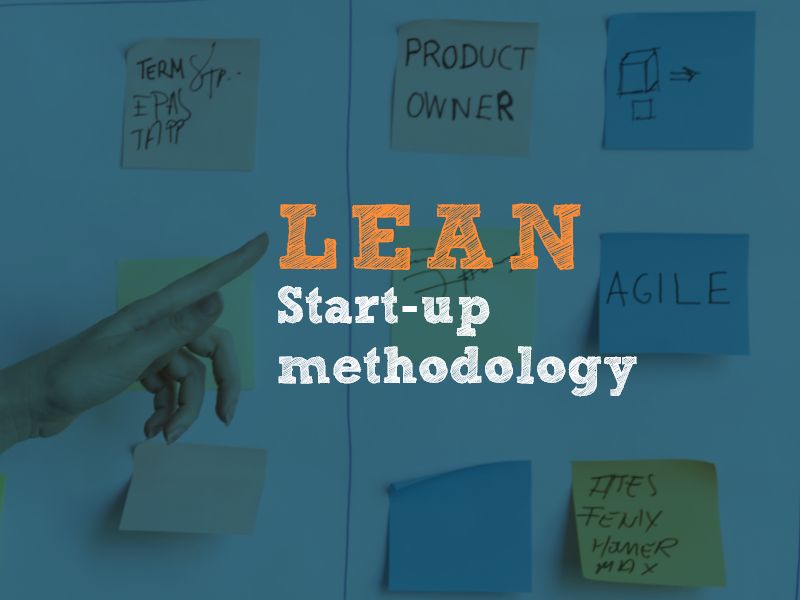How Can Lean Startup Methodology Prove Instrumental to Software Dev Success

From optimizing resources, and controlling expenses to positioning businesses for scaling easily when the product is launched, the lean startup approach brings it all that makes software development perfect. We dive into the nitty-gritty here.
If there is one fundamental reason why new businesses fail, it is that the product they are creating does not meet the demands of the market. In other words, the gap between what they provide and what people want is too great.
By assisting businesses in creating and improving goods based on user feedback before developing a final product and launching it, the lean startup approach seeks to solve this issue.
Businesses usually plan well in advance for developing their product of interest. The team starts working on the launch if there is interest and finance is provided, typically in “stealth” mode to avoid possible competitors from catching on. The issue with this is that there aren’t many opportunities for the business to test the idea with potential customers or obtain feedback while it’s being built up.
Businesses that employ Lean methodology use a set of procedures to test, create, measure, and learn, thereby building a strong lean software development life cycle. You can easily update and eliminate assumptions while also seeking input from customers.
The business quickly refines and reengineers the product as the concept enters production, tailoring it to what the market wants. Here, we will discuss more about the lean startup approach and the vital role it plays in software development.
What is lean startup methodology in software development?
The lean methodology offers a speedier way to get a desired product into the hands of customers. Offering a scientific approach to developing products, the lean methodology teaches you how to steer, turn, and endure when developing a product.
Significance of lean startup approach in software development
Let’s understand how the lean approach brings significant benefits to the software development process, streamlining and improving it for better outcomes.
Rapid experimentation and iteration
In traditional software development, there is often a long development cycle that culminates in a final product release. However, this approach can be problematic since it is often challenging to accurately predict what the customer wants. By the time the product is released, there is a high probability that the market has shifted, and the product may not meet the customer’s needs.
The Lean Startup method advocates for creating a minimum viable product (MVP) that can be tested in the market to gather feedback. The feedback gathered is then used to iterate on the product and create a better version that aligns with customer needs. This process of rapid experimentation and iteration allows companies to avoid costly mistakes by quickly testing and validating ideas in the market, which ultimately saves time and money.
Encourages a customer-centric approach
Traditionally, software development involved building a product that the company thinks the customer needs. However, this approach can result in a product that does not meet the customer’s actual needs.
In the Lean Startup method, the product is aligned with the customer’s needs by gathering customer feedback and continuously iterating on the product. By keeping the customer at the center of the product development process, companies can create a product that is better suited to their needs, which leads to higher customer satisfaction and increased sales.
Emphasizes agility and flexibility
Going with ordinary software development, making changes to the product is often difficult and expensive to make. However, the Lean Startup method advocates for being agile and flexible by iterating on the product quickly based on customer feedback.
So, the lean startup approach allows companies to pivot or change direction quickly if the market shifts or the product is not meeting customer needs. This agility is particularly important in the software industry, where technology is constantly evolving, and customer needs are constantly changing.
Encourages a data-driven approach
Earlier, decisions were often made based on intuition or assumptions. However, with the Lean Startup method, the decision-making is entirely data-driven.
By continuously testing and measuring the success of the product, businesses can make informed decisions based on real data rather than assumptions. This approach results in a better understanding of customer needs and helps companies make informed decisions that drive growth.
When you are working with a good custom software development company for startups you will witness how the next steps in the development cycle are based on insights that metrics and KPIs offer.
Comes with Pivot or Persevere approach
The Lean Startup method emphasizes the importance of knowing when to pivot or persevere with a product idea. This approach involves continuously evaluating the success of a product and making necessary changes to improve it.
If a product idea is not meeting customer needs or market demands, companies can pivot and change their approach. If a product idea is successful, companies can persevere and continue to improve it.
Provides Lean Budgeting and Improves product quality
The Lean Startup method promotes a lean budgeting approach that involves minimizing costs and maximizing value. This method encourages startups to reduce development costs without compromising quality by testing and validating product ideas with minimal resources. By focusing on creating value for customers and avoiding unnecessary expenditures, companies can ensure they are investing their resources wisely and achieving the best possible return on investment.
When it comes to product quality, the lean development methodology prioritizes customer feedback and validation. By testing and iterating based on customer feedback, software development companies can create products that solve real problems and meet customer needs. This approach also helps companies improve product quality and performance over time.
Improved Collaboration and Reduces risk
The lean methodology promotes a collaborative approach to product development. By involving cross-functional teams in the product development process, software development companies can leverage the expertise and skills of team members from different departments. This approach also
In terms of managing risk, the lean methodology in software development promotes a low-risk approach to product development. By creating an MVP and testing it in the market, software development companies can reduce the risk of investing time and resources in a product that may not meet customer needs or market demands.
Focuses on Value Creation and Promotes Continuous Learning
The lean methodology promotes a focus on creating value for customers. By understanding customer needs and creating products that solve real problems, software development companies can create a loyal customer base and increase revenue over time. This approach also helps companies build a strong brand reputation and differentiate themselves in the market.
Emphasizing the importance of continuous learning and improvement through continuous testing and iteration, the methodology allows software development companies to learn from their successes and failures and improve their products over time. As a result, this approach proves crucial in helping companies stay ahead of the competition and adapt to changing market conditions.
Conclusion
Innovative corporate cultures assist organizations in overcoming the obstacles they face in the rapidly evolving software development landscape. Diverse components come together to create an innovative business culture, in which lean methodology plays a significant role.
Using lean for software development can allow businesses to work in a very flexible, iterative, quick, and efficient manner while still keeping the needs of their customers at the forefront of all they do.
Organizations, however, must carefully follow lean startup methodology steps. Those who attempt to haphazardly implement lean software development methodology are bound to fail. Remember, lean startups are a framework rather than a list of instructions. At Finoit, we ensure to fit the generic framework to your unique requirements.
To know how we enable this and to implement lean methodology for your product development, connect with our development experts.
FAQs
How do I validate my product idea using the lean startup methodology?
For validating a product idea using the Lean Startup methodology, first identify the problem and clearly define your goals. You must understand the success criteria for your product and assumptions concerning it. Build hypotheses and conduct user research to validate them. Also, obtain insights about customer sentiments if they favour the product idea and refine it by introducing requisite changes.
What are the advantages of using the lean startup methodology over traditional software development methods?
With the Lean Startup process, businesses can swiftly validate their concepts and products, lowering the risk of investing in a concept that may not succeed. Additionally, it encourages ongoing iteration and improvement, which enables businesses to adjust to shifting market circumstances and customer demands. On the other hand, traditional software development methodologies are time-consuming and resource-intensive.
How can I implement the lean startup methodology in existing business?
Identify the area for which you want to build a software. Then build an MVP and test it. When you have a product that has been validated, use audience feedback to iterate. Continue the cycle till you reach the best version. Once you have a well-tested product, you can use it to drive improvements in your business.


